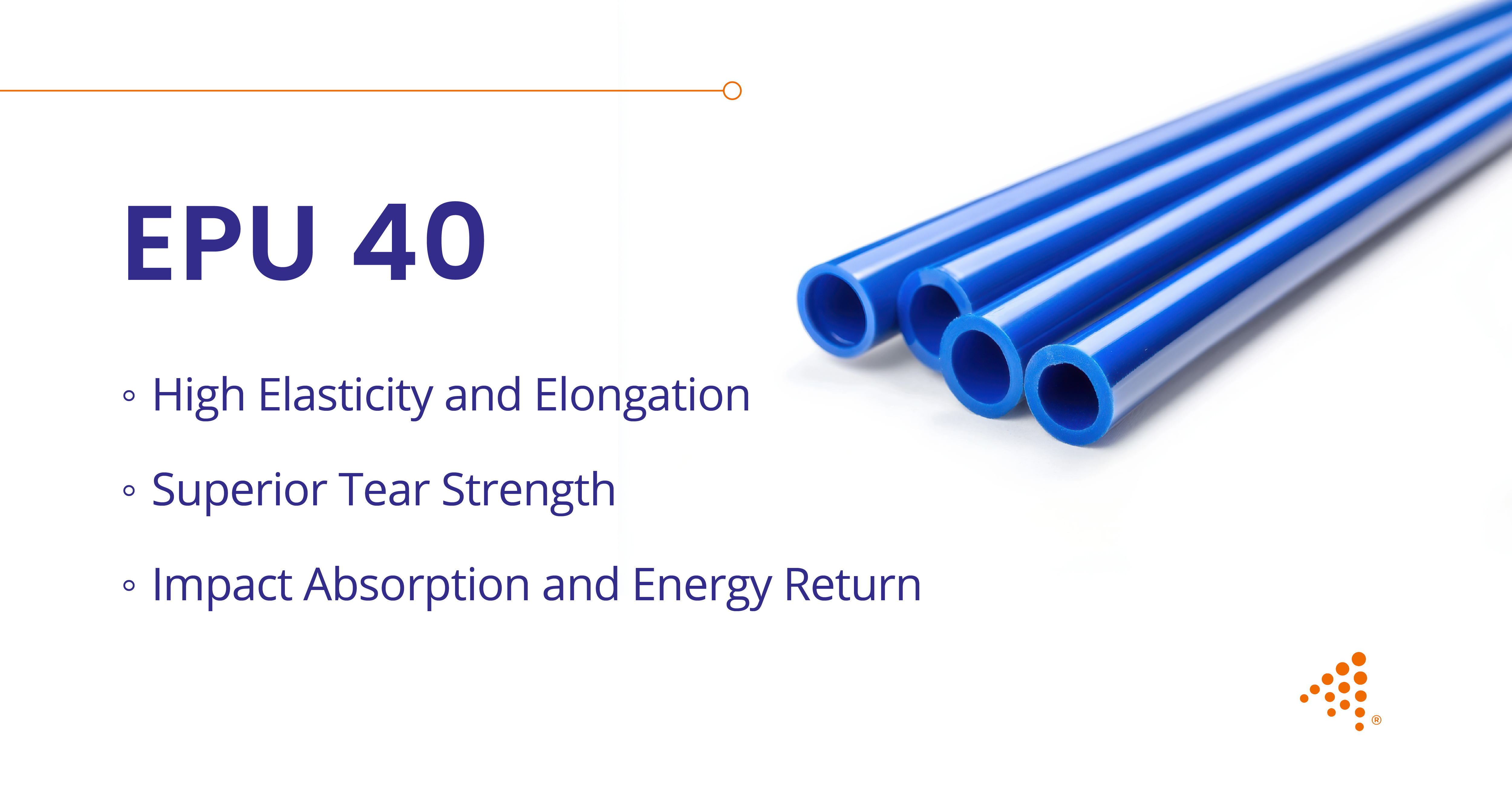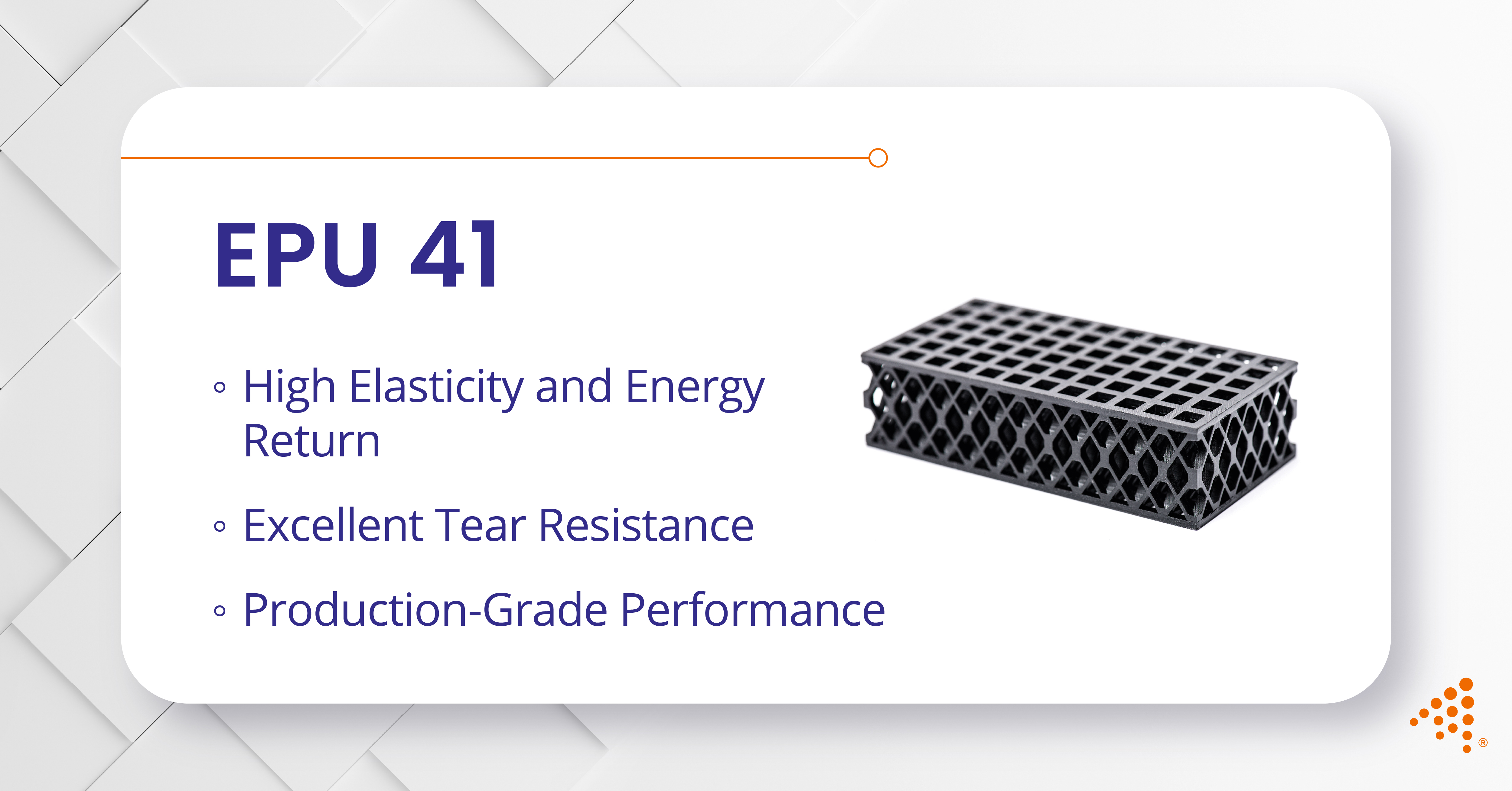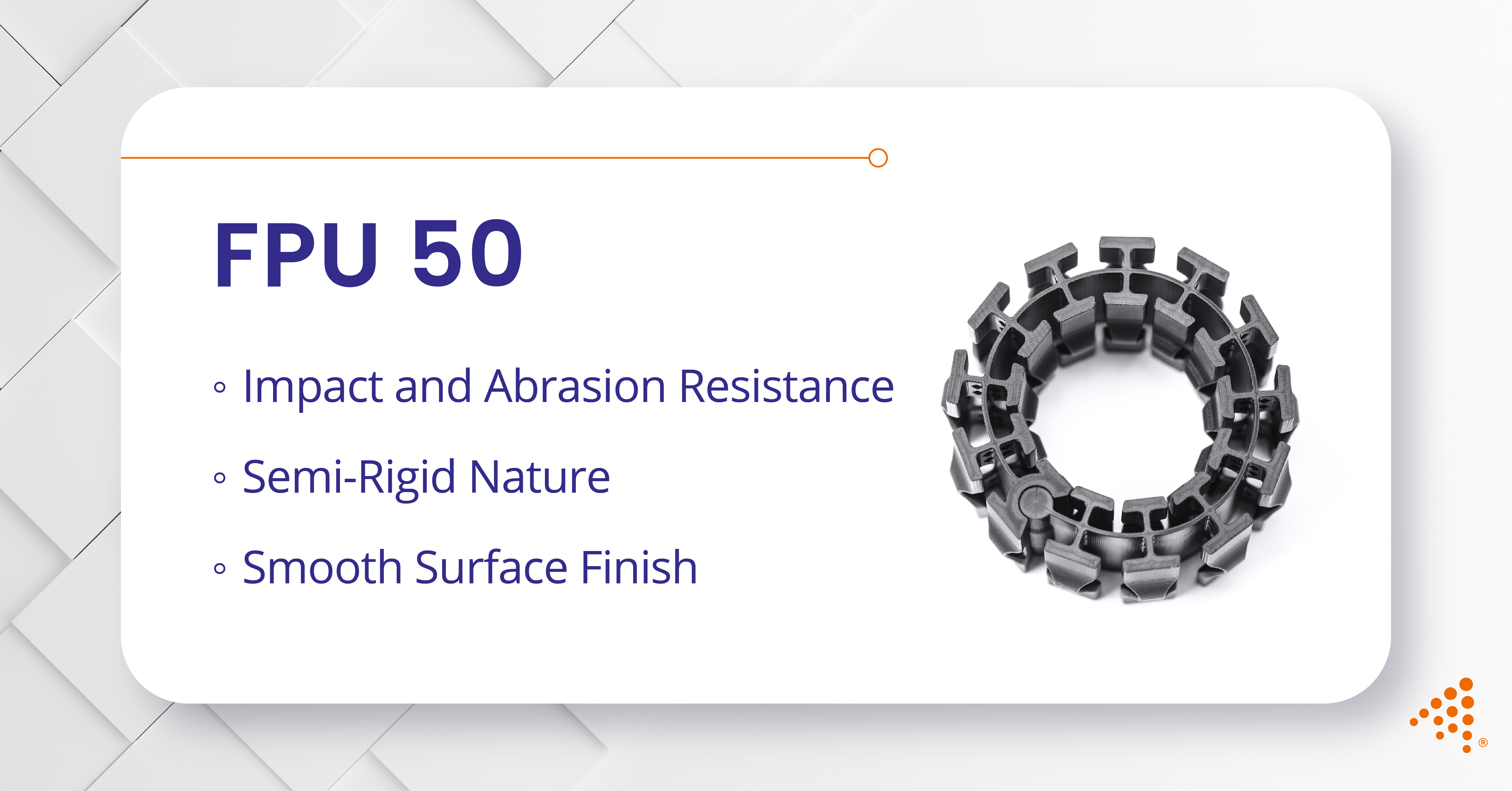EPU 41: High-Performance Elastomeric Polyurethane Resin
Elastomeric Polyurethane (EPU 41) is a versatile, production-grade additive manufacturing resin developed by Carbon. It is engineered to deliver...
4 min read
Nick Erickson : Jun 10, 2025 12:47:20 PM

Elastomeric Polyurethane (EPU 40) is a high-performance additive manufacturing material developed by Carbon, renowned for its unique combination of elasticity, tear resistance, and energy return. As a versatile elastomer, EPU 40 bridges the gap between traditional flexible materials and the design freedom offered by additive manufacturing services. It enables the creation of highly durable, flexible parts with intricate geometries, making it a compelling choice for industries ranging from consumer products to medical devices, often complementing or enhancing traditional manufacturing methods like injection molding.
Read More About Maximizing Mold Longevity with Aprios' Maintenance Strategy
EPU 40 stands out due to its rubber-like properties, offering performance comparable to some traditional elastomers while leveraging the benefits of Carbon's Digital Light Synthesis™ (DLS™) technology.
With an elongation at break exceeding 250%, EPU 40 can undergo significant deformation without fracturing. This high elasticity makes it ideal for parts that need to stretch, bend, or compress repeatedly while returning to their original shape—key for 3D printed prototypes and parts designed for Design for Additive Manufacturing (DfAM).
One of the defining features of EPU 40 is its substantial tear strength, measured at approximately 23 kN/m. This resistance to tearing is crucial for components subjected to shear forces or rough handling, ensuring longevity and reliability in demanding environments. Gaskets, seals, and protective coverings benefit greatly from this characteristic.
EPU 40 possesses a good capacity for energy return and impact absorption. This makes it suitable for cushioning, padding, and vibration isolation. While its resilience (around 29%) is notable, it's designed to effectively dampen impacts, protecting both the component itself and any associated systems.
For the medical device industry, material safety is paramount. EPU 40 has undergone testing and passed requirements for ISO 10993-5 (In Vitro Cytotoxicity) and ISO 10993-10 (Irritation and Skin Sensitization). This biocompatibility opens doors for its use in non-implantable medical components that require skin contact or proximity.
Designed for real-world use, EPU 40 exhibits good durability and has been tested for UV aging performance, simulating indoor exposure to solar radiation. This ensures that parts maintain their mechanical properties and appearance over time, even with moderate light exposure.
Connect with our DFM experts for tailored guidance and injection molding quality control insights that ensure every part meets your performance goals.
The blend of flexibility, strength, and biocompatibility allows EPU 40 to serve a wide array of functions across various sectors.
The high tear strength and elasticity make EPU 40 a strong candidate for custom gaskets and seals. Its ability to conform to surfaces and maintain a seal under compression, combined with the design freedom of 3D printing, allows for optimized sealing solutions in complex assemblies.
From protective casings for electronics to dampening components in machinery, EPU 40's impact absorption properties are highly valued. It can be engineered into lattice structures to create foam-like materials with precisely tuned cushioning responses.
Leveraging its biocompatibility, EPU 40 is used for items like comfort padding on wearables, flexible instrument grips, seals for diagnostic equipment, and patient-specific models or guides.
EPU 40 powers innovation in sporting gear, ergonomic grips, and footwear inserts. Its soft-touch, tear-resistant qualities suit everything from wearables to personal care items, especially when produced via low-volume injection molding or quick-turn injection molding to meet demand spikes or seasonal variations.
Read More About Guide to Polypropylene (PP): A Versatile Material for Manufacturing
EPU 40 is often compared to commercial Thermoplastic Polyurethanes (TPUs) with a Shore A hardness of around 70. In terms of feel and flexibility, it offers a similar performance profile to these widely used materials. If you were considering a 70A TPU for an injection molding project, EPU 40 provides a comparable tactile experience and elastic behavior.
However, the key difference lies in the manufacturing process and design possibilities. Traditional injection molding is ideal for high-volume production of relatively simpler geometries. EPU 40, utilized through Carbon's DLS process, excels in producing highly complex, intricate, or customized elastomeric parts, including sophisticated lattice structures that are impossible to mold. This makes EPU 40 an exceptional choice for prototyping elastomeric parts destined for molding, as well as for low-to-mid-volume production runs where tooling costs would be prohibitive or design complexity demands an additive approach. It allows for design iterations and functional testing with a material that closely mimics the end-use TPU.
Read More About Injection Molding Defects: Discoloration – Why It Happens and How to Avoid It
Despite its many advantages, there are considerations to keep in mind when selecting EPU 40.
Like many polyurethanes, EPU 40 requires specific processing conditions, including controlled washing and thermal curing (typically 8 hours at 120°C or 248°F) to achieve its final properties. Furthermore, studies have shown that immersion in water can cause a decrease in initial stiffness, while aging in a dry state can lead to an increase. These effects should be considered in design for manufacturing (DFM) development services to align material behavior with product expectations.
While the curing temperature is relatively high, EPU 40's glass transition temperature (Tg) is around 8°C (46.4°F). This means its performance, particularly its resilience and stiffness, can change significantly around and above typical room temperatures. It is generally not suited for plastic injection molding services requiring high-temperature environments where sustained heat resistance is critical.
While offering good energy return, EPU 40 has lower resilience compared to its counterpart, EPU 41. For designs where maximizing bounce and minimizing energy loss is the primary goal, especially at temperatures above -10°C (14°F), EPU 41 might be a more suitable selection.
Partner with a trusted additive manufacturing company offering Carbon DLS prototyping and custom manufacturing services to bring your ideas to life—faster and better.
EPU 40 offers a compelling material solution when you need durable, tear-resistant, and highly flexible components. Its ability to create complex geometries through the DLS process makes it invaluable for producing parts that cannot be achieved with traditional methods, such as intricate lattice structures for optimized cushioning or integrated seals within a single component.
Its biocompatibility provides confidence for medical device manufacturers looking for skin-contact-safe elastomers. For companies familiar with TPUs and injection molding, EPU 40 serves as an accessible and effective material for prototyping and producing functional elastomeric parts, offering a pathway to innovate beyond the constraints of conventional manufacturing while maintaining desirable material design for manufacturing solutions.

Elastomeric Polyurethane (EPU 41) is a versatile, production-grade additive manufacturing resin developed by Carbon. It is engineered to deliver...

Elastomeric Polyurethane 44 (EPU 44) is a highly elastic and tear-resistant material developed by Carbon for its Digital Light Synthesis™ (DLS)...

Flexible Polyurethane (FPU) 50 is a semi-rigid material from Carbon known for its exceptional impact, abrasion, and fatigue resistance. This...